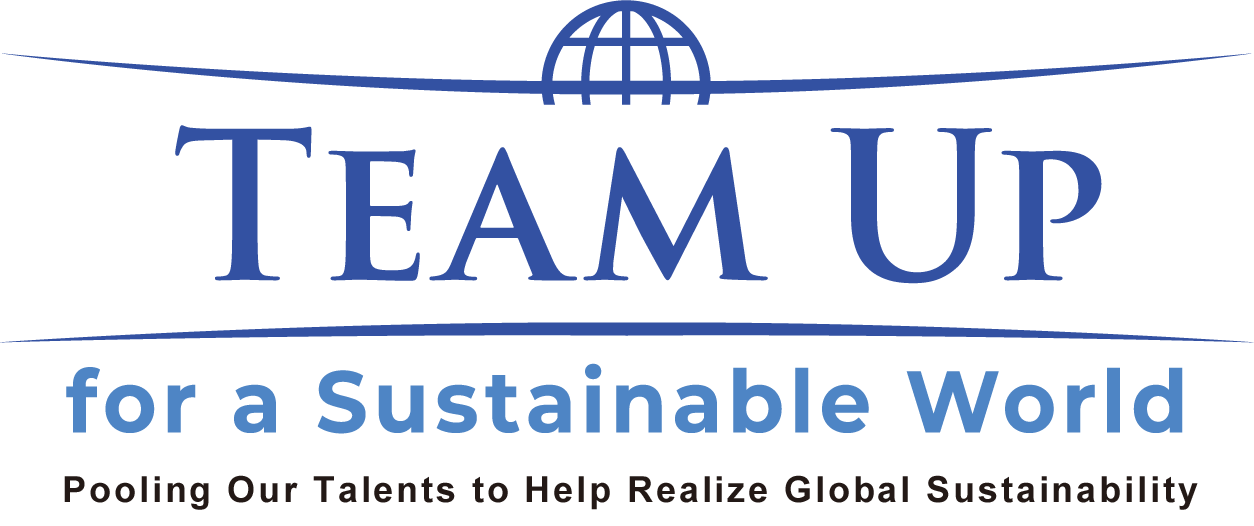TEAM UP for a Sustainable World:Decarbonization — Capturing a Huge Business Opportunity
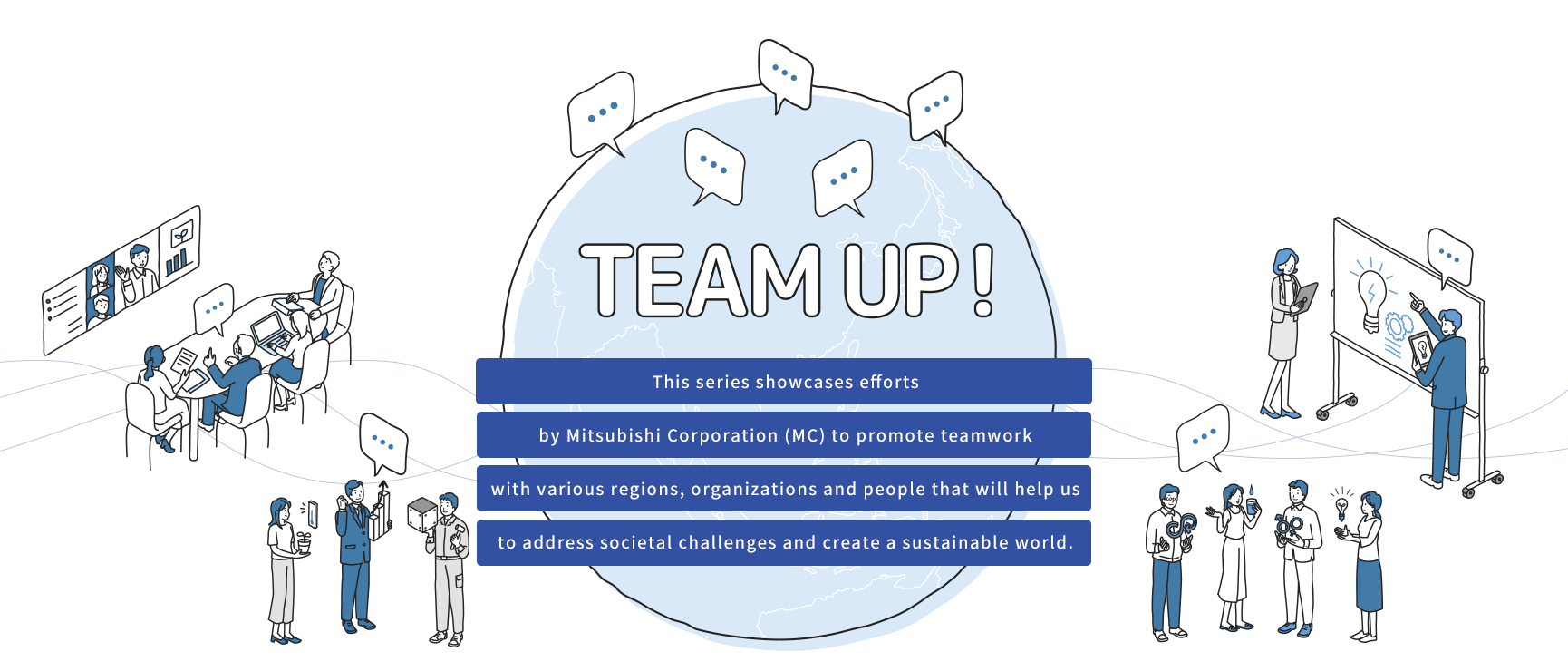
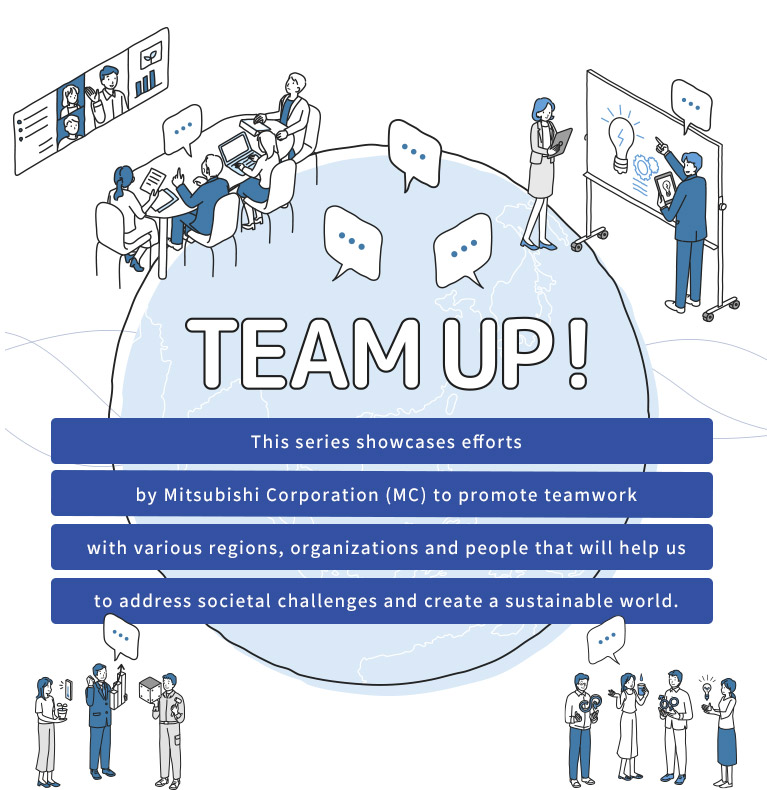
Decarbonization — Capturing a Huge Business Opportunity TEAM UP for a Sustainable World
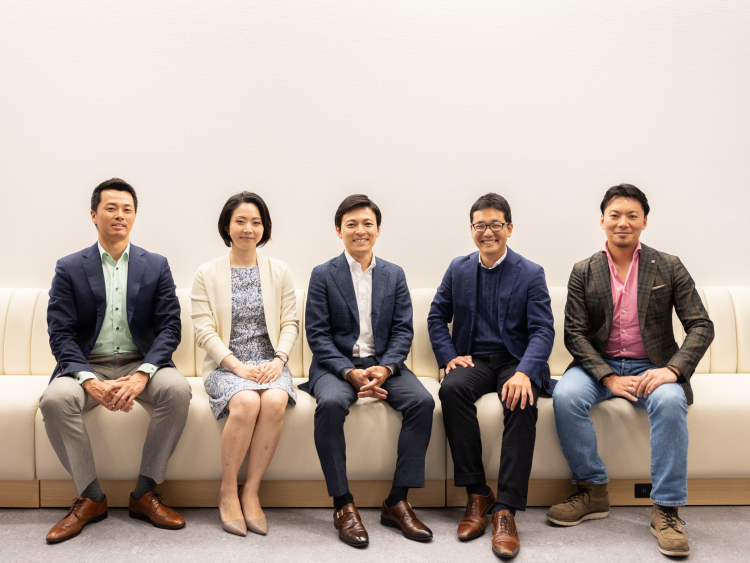
Breakthrough Energy Catalyst (BEC) (3)
Bill Gates has described climate policies as the greatest tests and business opportunities for humankind. His program Breakthrough Energy Catalyst (BEC) aims to promote societal adaptations of innovative net-zero energy technologies, and MC is one of its anchor partners. What challenges is MC's BEC team taking to accelerate the growth and use of these technologies? In part two of our roundtable discussion, GLOBE+ Editor in Chief Takashi Horiuchi asks five of the team members based in the US to share their ambitions for decarbonizing Japan and Asia, and explain what motivates them to do this work.
- Roundtable Participants (MC Business Groups and BEC teams/fields of work) in parentheses)
-
Ryosuke Okumura (Natural Gas Group, BEC Project Team)
Shogo Yahagi (Petroleum & Chemicals Solution Group, BEC SAF Project Team)
Noriaki Takano (Power Solution Group, BEC LDES & Clean Hydrogen Project Team)
Masaki Harada (Natural Gas Group, BEC DAC Project Team)
Sherry Kitajima (Corporate, EX Research) - Interviewer
- MC's employees were interviewed by GLOBE+ Editor in Chief Takashi Horiuchi (During the interview)
Inspired to Join BEC and Provide a Fresh Boost to MC
—— MC announced its membership in BEC in April 2022. Mr. Okumura and Mr. Harada, I understand that you were both involved right from the start, when MC first began considering partnership. Can you tell me how it all came about?
Harada It was July of 2021 when we first encountered BEC and learned about the program's concept. Although we strongly agreed with Bill Gates' philosophy, the fact that the project was a test of global proportions made it difficult to grasp its full complexities, and that made us a bit apprehensive. I got a call from Mr. Okumura in Houston, and I remember him saying to me, "Right now there's probably less than a 1% chance that MC will join the program, but opportunities like this are few and far between. We need to look at this rationally and consider how it could provide a fresh boost to our company." His words were really encouraging. After that, the two of us became immersed in the program. We gave many presentations, both to BEC's representatives and to our colleagues at MC. During the former, we discussed how significant it would be for MC to become BEC's first anchor partner in Asia, and during the latter we explained all of the new initiatives that the program was taking. Before we realized it, more and more of our colleagues had gotten on board, and in the end, MC's upper-management team was fully behind the idea. When I considered that we were able to join the program despite the odds being less than 1%, I was reminded of what a broad-minded company MC is, which really encouraged me to continue appreciating my place in it and taking on new challenges.

Okumura My thoughts were that the BEC program embodies the concept espoused by the American economist Michael Porter, namely the competition to create shared value and pursue philanthropic businesses that prioritize social contributions over profit, which basically describes how enterprises need to seek economic value through their efforts to address societal problems. In truth, the BEC structure is revolutionary in its marrying of philanthropy and industry, and it really drives home the importance of the expression "out with the old, in with the new." Finding solutions to climate change is the responsibility of this century's human race, but we have to turn decarbonization into a massive industry if we hope to fulfill that responsibility. In Bill Gates' words, this is a "huge economic opportunity."
—— I'd like to ask about connections within MC itself. Decarbonization businesses undoubtedly need to cut across your existing industry-specific groups, so what efforts have you been making to create synergy between them?
Kitajima A lot of businesses related to energy transformations cannot be tackled by just one group, and that includes BEC's targeted area of decarbonization. A good example is SAFs, which we touched on in part one of our discussion. The raw materials for those fuels include things like soybean oil and beef tallow, which are handled by our Food Industry Group. BEC describes itself as a "catalyst" to connect new technologies, industries, consumers and suppliers, and I think that's a good word to describe my role in corporate. As an "in-house catalyst," my job is to connect our different organizations, and every day I'm speaking with professionals who work not only at MCA, but also at Mitsubishi Canada, Mitsubishi Mexico, and so on. I'm also taking advantage of digital tools to enhance communication and information exchanges, which are obviously very important.
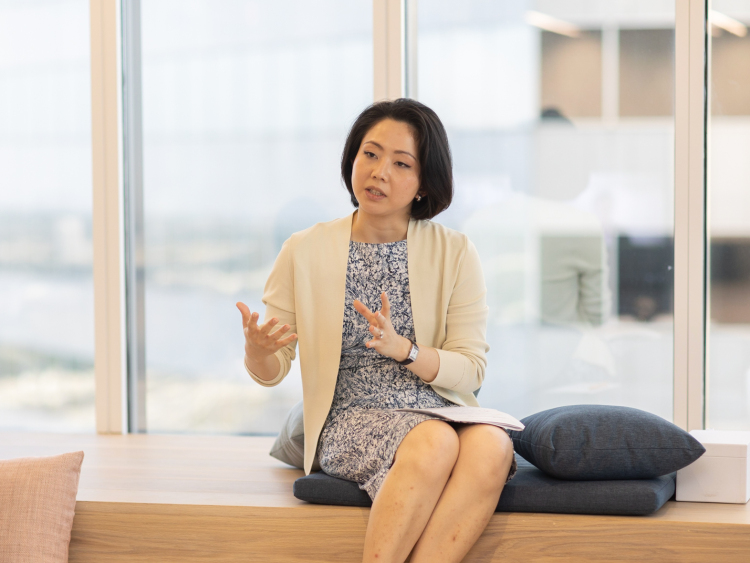
Okumura One thing that I've been trying to do is minimize communication barriers. Just as Mr. Yahagi is our SAF rep, Mr. Takano is our clean-hydrogen-and-LDS rep, and Mr. Harada is our DAC rep, each person has his or her own separate area of focus. I've adopted the self-made title "AMA Rep," which stands for "Ask Me Anything" (laughs). Thanks to Ms. Kitajima, our digital tools are getting better, and I've been receiving quite a few light-hearted inquiries. It's important to manage information carefully, but I'm still getting used to the idea of accommodating whatever crosses people's minds.
Possible Partnerships with Global Enterprises and Governments
——BEC's anchor partners take the lead in selecting its projects, and alongside MC, they include global heavyweights like Microsoft, ArcelorMittal, and Shell. What kinds of interactions have you had with those companies?
Harada Microsoft is aiming to be carbon negative by 2030, so it has become one of the world's leading purchasers of carbon credits, which we also discussed last time. Being able to hear Microsoft's people talk about their outlooks and pain points in detail has proven very useful to the DAC project team, in terms of identifying new businesses and collaborations.
Takano In its efforts to help decarbonize the steel industry, ArcelorMittal is making genuine strides to produce direct reduced iron solely with hydrogen, the technologies for which have proven extremely difficult to develop. Our project team has learned a lot from its meetings with the steelmaker, in terms of how it's been constantly rethinking its roadmap, collaborating with other parties and making adjustments. As partners in the quest to decarbonize, we're creating more and more opportunities to bounce ideas off one another.
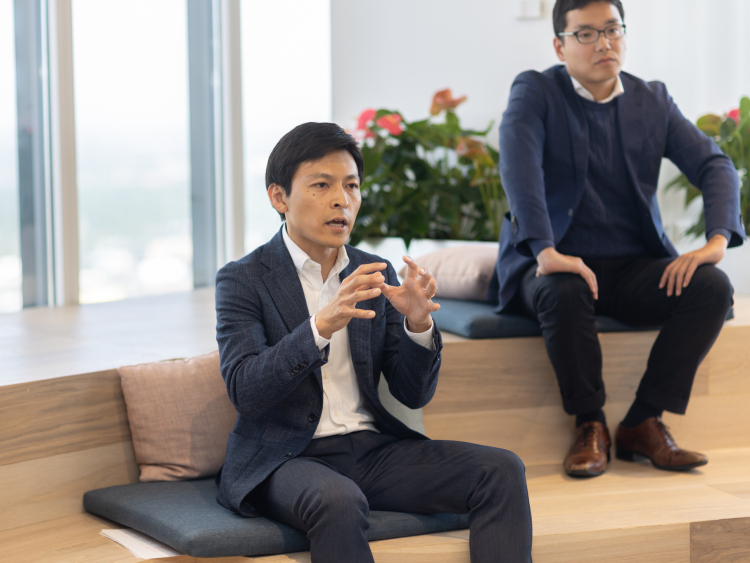
Yahagi Shell has been an important partner to MC in the LNG field for a long time, but now we're both anchor partners at BEC. Just the other day, we had a meeting with Shell to discuss possible collaborations in new decarbonization businesses.
—— BEC is a platform not only for alliances between private enteprises, but also for public-private partnerships. Why is it significant for governments and private businesses to work together to achieve net-zero societies?
Harada The projects that BEC is targeting for investment are those aspiring to develop innovative net-zero technologies that have progressed beyond the R&D stages and scale them up for commercialization. Once they have reached this point, the projects require large-scale infrastructure developments that would be difficult for governments or private enterprises to tackle on their own, which is why public-private partnerships are so important. Government action is already underway in the West, where public funds are now being allocated to help scale up a variety of technologies, and because decarbonization is becoming an increasingly international pursuit, there will likely be more opportunities for that kind of support in other regions.
Solving Societal Problems and Creating Shared Value
—— In May 2022, MC announced its latest management plan, Midterm Corporate Strategy 2024. The plan's objective to create MC shared value mirrors BEC's philosophy, but how does MC plan to use what it takes away from the program?
Yahagi The SAF market is currently focused on western countries, which are structured well and have well developed systems. So for now, we'll be leveraging our involvement in BEC to promote mass production and societal adaptations of SAFs in those countries. Hopefully, we'll later be able to adapt and adopt those models for Japan and other Asian markets, but for that to be possible, we're going to have to build a foundation for SAFs, and that's going to require pooling our capabilities with those of our industry partners, governments and other players.
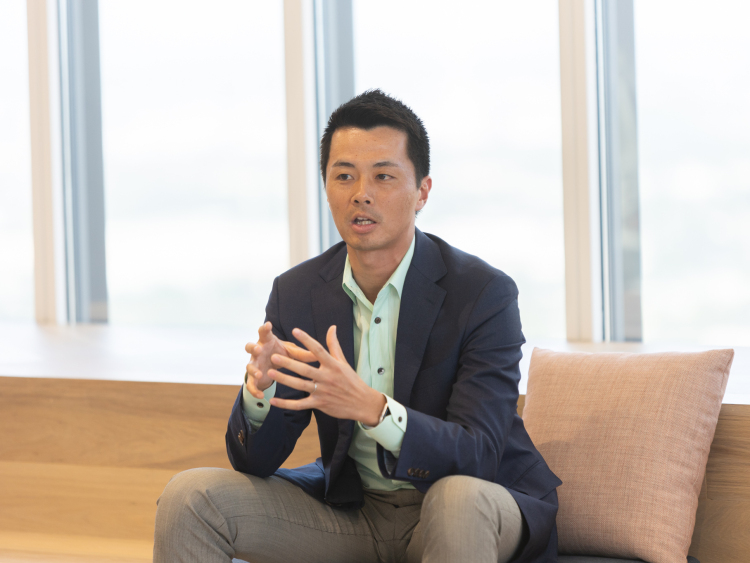
Harada The quest for net zero will give rise to new industries, but it could also jeopardize existing ones, which is why we need to take full advantage of the latest know-how and intelligence gained from our BEC activities and partner networks. I think that our role in leveraging those assets to gain a more accurate understanding of global trends is an important one, and we can use it to help remap MC's portfolio when the time is right, without being overly pessimistic or optimistic about the future.
Takano BEC may be a worldwide program to promote advanced tech, but local solutions providers will be just as important. On that point, MC has a strong, lengthy, and global track record in the building of local partnerships. One of the things our company values most is "communicating with communities" to promote its regional operations. BEC's powerful leadership in decarbonization and MC's frontline expertise should work very well together, and I'm hopeful that we can take advantage of that synergy to create sustainable value.
Kitajima I think that BEC's philosophy of balancing net zero with sustainable economic growth matches perfectly with MC's objectives in Midterm Corporate Strategy 2024. The program's activities are something we should take pride in, and they can be shared as case studies with MC's roughly 1,700 Group companies around the world. If such activities can catch on throughout the MC Group, I think that they will have tremendous influence.
Working Together to Realize a Carbon-free World
—— How do you hope to lead Japan's net-zero reforms, and what about this work inspires you the most?
Yahagi Nowadays, oil is considered an essential part of our lives, but in the future I'd like to help make more things that contribute to decarbonization equally ubiquitous. To achieve that goal, we'll need to engage a variety of stakeholders and function as a true catalyst in the fields of petroleum and chemicals. Ideally, I'd like us to be a positive influence on many different levels.
Takano Up to now, I've been involved in power generation projects with different stakeholders in Japan, and I've experienced the pressure of having to succeed in businesses precisely because they've only involved Japanese interests. I'm hoping that our BEC project team's efforts to create carbon-free societies will rekindle that desire to see Japan play a leading role.
Harada To achieve global net zero, Asia will also need innovative frameworks that incentivize both suppliers and consumers. I'd like MC to be a leader in absorbing knowledge through BEC and spreading it to other Asian countries.
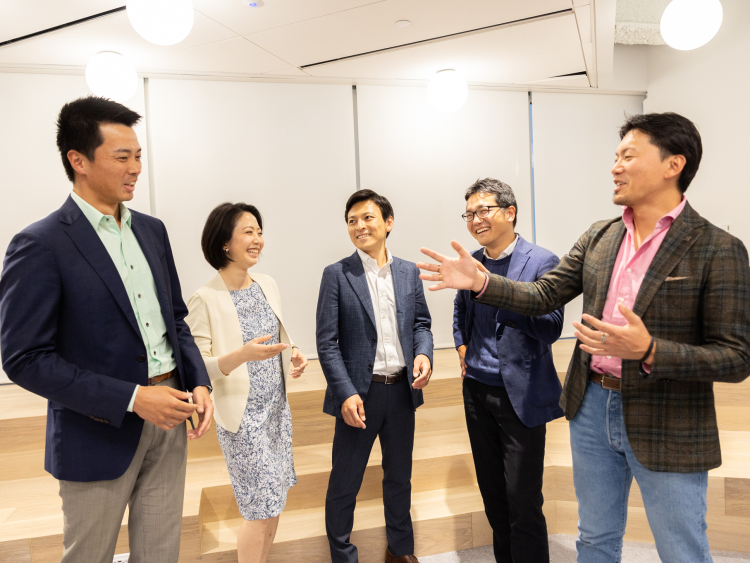
Kitajima BEC's partners include a number of large American financial institutions, such as BlackRock, which is the world's largest asset-management company. The very fact that so many influential enterprises are taking part in the project is hugely significant. I think that the trust MC's going to earn through its involvement in BEC should prove beneficial in future efforts to decarbonize the finance industry, and I find it motivating to be jointly engaged with global heavyweights in businesses that capture the attention of so many different stakeholders. I'm looking forward to taking on more of those challenges in the days ahead.
Okumura It's often said during our meetings at BEC that there are only two numbers we need to remember, "51 billion" and "0 (zero)." They refer to our goal to reduce the world's 51 billion tons in annual greenhouse-gas emissions all the way down to zero. This is an absurdly ambitious target, so open innovation will be vital to achieving it. I urge anyone who is seeking to innovate or launch net-zero startups to contact MC, or even reach out directly to me. I'm excited about working with those who share our ambitions for a carbon-free world.
- Breakthrough Energy Catalyst (BEC) (1)
- Breakthrough Energy Catalyst (BEC) (2)
- Breakthrough Energy Catalyst (BEC) (3)
